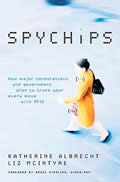Other
Yates
Articles:
Scuttling Bad Trade Agreements
RADICAL FEMINISTS: USEFUL IDIOTS
By
Steven Yates
August 1, 2006
NewsWithViews.com
A useful idiot is someone who, while zealously promoting one cause, ends up advancing a very different one through stupidity, naivete or inattention. The useful idiot never sees the big picture. Vladimir Lenin, the first Soviet dictator, is credited with coining the phrase, although according to P. Boller and J. George�s They Never Said It, he�well�most likely never said it. Not even in Russian. Whatever its origins, the phrase sometimes comes in handy.
My first two experiences with radical feminists in academia didn�t make much of an impact on me until later. The first was in Fall 1987 at Clemson University in Clemson, South Carolina. It was my first full-time job out of graduate school, and I was making a presentation on what was then my area of expertise: theories about the conceptual foundations of science and the dynamics of scientific change. After outlining four such theories, I took questions. At one point a female graduate student put up her hand and wanted to know to what extent I could relate the scarcity of women in science to scientific method. I hadn�t thought about it. The question had never occurred to me. A few women have made major contributions to science. Madame Curie comes to mind. Their methods weren�t different than those of men, so I considered the range of methods employed in the sciences to be gender-neutral. The relative scarcity of women in science I attributed mostly to women�s overall lack of interest in science. My politically incorrect answer caused me no problems at the time. This was, after all, before the main wave of feminist incursions into academia and the rise of political correctness (speech control, thought control).
The second incident occurred a few months later at an American Philosophical Association (APA) meeting where I had a job interview. The APA is the largest organization of philosophy professors in the country. What I saw and heard was from the hall because of an unusually large, overflow crowd. A somewhat diminutive woman was being verbally attacked�hissed at, in fact!�by an audience that seemed to be mostly women. None of the panelists (also women) came to her defense. The meeting�supposedly of adults and professionals�disintegrated into chaos. I wasn�t sure what I had seen until months later, when reports began circulating and angry letters to the editor began appearing in the association�s flagship journal.
The diminutive woman, I learned, was Christina Hoff Sommers, a then-unknown professor at tiny Clark College in Massachusetts. She had read a paper on �Feminists Against the Family,� arguing just that to an audience unused to having its basic premises questioned. Sommers had concluded that feminists in academia were more interested in promoting revolutionary social change than in furthering a responsible exchange of ideas. Their ends justified their means. Among the ends they wanted was an end to the traditional, nuclear (two-parent) family. According to their Marxist view of things, the family is a repository of gender-oppression. Men are bourgeois; women are proletariat. Such notions, however contrived and unoriginal, took academia by storm in the 1980s and even more so in the 1990s.
Sommers distinguished between �liberal� feminism and �gender� (radical) feminism. The first promoted, e.g., equal pay for equal work, and opposed discrimination. The latter is a full-fledged worldview that subjects every institution of society to scrutiny through the lens of gender. Sommers had no quarrel with the former; she had plenty of quarrels with the latter. Its influence, which puts science under the gender microscope along with everything else, explained the question from the Clemson graduate student.
I met Sommers a couple of years later. My interests had begun shifting from the foundations of scientific method to political thought and the foundations of a free society. I was interested in libertarian ideas and was networking with other libertarian philosophers, several of whom had befriended her. We were all outsiders, after all, because we were not collectivists. Based on what Sommers had to say, and on a few of her articles, I took a look at so-called �feminist scholarship.� What I found jolted me. One radical feminist called Newton�s and Bacon�s ideas about scientific method a �rape manual� (they spoke of �penetrating� nature�s secrets�get it?). Another compared a romantic candlelight dinner to prostitution. These are just two examples, and not even the weirdest (don�t ask!). Around this time it surfaced that a �feminist legal theorist, � Catharine A. MacKinnon, had compared voluntary sexual intercourse to rape. That oversimplifies somewhat; what she says is that in �male-dominated, patriarchical, heterosexist society� the line between voluntary consent and coercion is blurred, so that in sexual relations between men and women a fine distinction between �voluntary� intercourse and rape can�t be drawn. Yup: under the insidious patriarchy, men as a collective are potential rapists; women are helpless victims.
It seemed like a sick joke to me. Men dominating women? Where? At the time I couldn�t even get a date, much less find someone to dominate. Approach an academic woman? I�d have to have been out of my mind! But these people were being lionized and treated as heroines who had cracked the academic �glass ceiling,� and whose �scholarship� was �cutting edge.� They were employed permanently by their institutions and paid comfortable salaries, while guys like myself struggled to survive as academic cheap labor. We migrated from school to school to school on �visiting assistant professor� contracts or �adjunct� appointments every one, two or three years.
It would not have been as bad if the world according to radical feminism weren�t pure fantasy. There is no �patriarchy�! The courts clearly favor women in divorce and child custody cases, and have for years. Women tend to live longer then men�possibly because men have long tended to work in more hazardous occupations, and are far more likely to die of work-related injuries than women. Far more attention is paid to�and government money spent on�women�s health issues than men�s health issues. Men have always been the ones to fight and die in wars, or suffer war-related disabilities. (Radical feminists apparently want as many women killed or maimed in wars as men�hence �women in combat.�)
Radical feminist �research� on academic topics like the philosophy of science is often just silly. Some of their proposals, e.g., for �female friendly science,� seem to invite ridicule�which they sometimes receive, as when around 1990 a responsible woman philosopher named Marguerita Levin asked sarcastically whether �feminist airplanes would stay aloft for feminist engineers� (�Science and Feminism,� The American Scholar). The more I investigated affirmative action programs, the clearer it became that they explained the growing influence of radical feminism (also multiculturalism and other chicaneries of the politically correct era). At the root was the longstanding commitment to collectivism generally. Preferential hiring for �diversity� had led to a free fall in quality control. Political correctness, when it rushed across the landscape like a tornado in the 1990s, made the free fall semi-permanent. (Now to be sure, academic philosophy wasn�t setting the world on fire before this nonsense started, but that�s another article.)
Christina Hoff Sommers went on to write Who Stole Feminism? (1994). Under sustained attack in academia, she dropped her APA membership and finally left teaching for a research position at the American Enterprise Institute in Washington. There she researched and wrote The War Against Boys (2000).
Today, the fruits of radical feminism are everywhere in evidence. The nuclear family is in trouble (although in fairness this is due more to the collapse of real, debauched-dollar-adjusted wages forcing both parents to work). Radical feminists dominate many academic humanities departments, including where I did my graduate work; they are well represented in many administrations at four-year research institutions; they control professional groups such as the Modern Language Association. Much contemporary �scholarship� is predictably sex-drenched and gender-obsessed.
Meanwhile, enrollment statistics over the past few years indicate a fall-off in men enrolling in four-year institutions. This has begun to attract national attention. Recent stats indicate that the percentage of men on college and university campuses has fallen to 43 percent nationwide, with some institutions falling under 40 percent. This is treated like a great mystery: why are men falling behind? To those of us who have watched gender politics in academe since the 1980s, the answer is obvious. No man with self-respect is going to sit in a classroom, at the mercy of a radical feminist professor�s denunciations, if he has an alternative. With political correctness shackling free speech, men are speaking with their feet. Some are going to less-politicized technical colleges. Others are choosing occupations that don�t require a four-year degree.
Has radical feminism helped women? A better question might be: was it intended to help women? Some think not. Many women have the careers feminism promised�but also kids born out of wedlock, from one-night stands and the feminist conviction that �a woman needs a man like a fish needs a bicycle.� They come home from work exhausted and then have one or more kids to handle. The result: stress, exhaustion, burn-out. Boys, meanwhile, grow up without proper male role models. One of the effects of radical feminism is the feminization of boys and men. Masculine assertiveness is �out�; �metrosexual� sensitivity is �in��a recipe for trouble. As Christina Hoff Sommers argues convincingly, normal boys just aren�t wired that way.
Some men are consciously deciding to stay single. They will not approach women, in college or at work, out of fear of guilty-if-charged �sexual harassment� allegations. And with one in two marriages ending in divorce, they are justifiably afraid of being cleaned out�of having their finances destroyed by divorce courts that favor women. Worse still, more than one man has had his life ruined by malicious child-molestation allegations. Again, guilty if charged. Not to mention the emotional devastation to kids after watching their parents fight, sometimes for years.
All of which presages a lot of people�of both sexes�growing older alone.
Could it be that someone wants things this way, because when people�s�especially children�s�families are dismembered and they are psychologically cut off from the most important support network a person can have in an impersonal, materialistic society, they are vulnerable? How does all this tie in with my opening paragraph?
In a recent interview with The New American (June 12, 2006), Aaron Russo, currently of America: Freedom to Fascism fame, reports how he once defended his sympathy with the women�s movement and with equal opportunity to an unnamed member of the Rockefeller clan. Russo describes the chilling response: �He looked at me and said, �You know, you�re such an idiot in some ways. We � created the women�s movement, and we promote it. And it�s not about equal opportunity. It�s designed to get both parents out of the home and into the workforce, where they will pay taxes. And then we can decide how the children will be raised and educated.��
|
Subscribe to the NewsWithViews Daily News Alerts! |
Behind
the feminist movement, like a shadow, was the super elite lusting
for control�over men, over women, over children, over the workplace,
over education, eventually over society itself. Radical feminists�obsessed
with gender politics but never looking behind the scenes�have been
great useful idiots for over 40 years. Feminism was never really about
women or their opportunities, which is why its benefits, viewed objectively,
turn out to be illusory. A lot of women have filled their prescribed
roles unwittingly. Still more have followed their leaders naively.
Political correctness has been a good tool for gaining the cooperation
of men�or, at least, intimidating many of them into silence. Thus
today�s �feminized� order: women don�t trust men; men don�t trust
women. Women have careers in record numbers; their children are in
state-sponsored daycare where they begin their indoctrination into
New World Order globalism and the Earth Charter. Neither men nor women
have lives. Neither pays significant attention to their real enemies
at the top.
� 2006 Steven Yates -
All Rights Reserved
Steven Yates earned his Ph.D. in Philosophy in 1987 at the University of Georgia and has taught the subject at a number of colleges and universities around the Southeast. He currently teaches philosophy at the University of South Carolina Upstate and Greenville Technical College, and also does a little e-commerce involving real free trade. He is on the South Carolina Board of The Citizens Committee to Stop the FTAA.
He is the author of Civil Wrongs: What Went Wrong With Affirmative Action (1994), Worldviews: Christian Theism Versus Modern Materialism (2005), around two dozen philosophical articles and reviews in refereed journals and anthologies, and over a hundred articles on the World Wide Web. He lives in Greenville, South Carolina, where he writes a weekly column for the Times Examiner and is at work on a book length version of his popular series to be entitled The Real Matrix (hopefully!) to be completed this summer.
E-Mail: freeyourmindinsc@yahoo.com.
Marxist view of things, the family is a repository of gender-oppression. Men are bourgeois; women are proletariat. Such notions, however contrived and unoriginal, took academia by storm in the 1980s and even more so in the 1990s.















